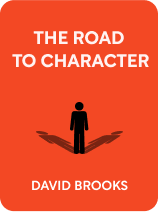

This article is an excerpt from the Shortform book guide to "The Road to Character" by David Brooks. Shortform has the world's best summaries and analyses of books you should be reading.
Like this article? Sign up for a free trial here .
What are the key takeaways in David Brooks’s book The Road to Character? In what ways has society shifted from a “we” to a “me” mindset?
The Road to Character by David Brooks is about the modern shift in moral character. Brooks provides many examples of important events that occurred in the past that wouldn’t have happened, had the people involved been as selfish as people today.
Keep reading for a brief overview of The Road to Character.
The Road to Character: Book Overview
Would you rather develop a new product or develop your soul? What matters more to you—being a successful CEO or being someone who always lends a helping hand? Having a pile of money in the bank or knowing that your retirement years will be shared with friends and family who adore you?
These are the kinds of questions considered in The Road to Character by David Brooks. Brooks believes we live in a cultural framework that emphasizes exterior success—money, fame, status, work promotions, and other upwardly mobile achievements—at the expense of our virtue and inner character.
In order to succeed in that framework, we’ve become narcissists. Because we want to ascend the ladder of success, we put ourselves at the center of our own universe. Almost every minute of our days must be spent working toward some achievement. We inflate our resumés with accolades and promotions. We have lunch with the “right” people. We trade up to larger houses and fancier cars. We enroll our kids in the best schools. We spend our lives in pursuit of superficial, materialistic gains because we believe this will make us happy. The problem is that these accomplishments don’t give us deep satisfaction—eventually, they leave us feeling hollow and empty, wondering what it was all for.
The Road to Character argues that in order to live more meaningful lives, we need to move toward a moral renewal. We need to ask ourselves how we can better serve the world instead of just serving ourselves. If we start paying more attention to living virtuously and strengthening our character rather than building our resumés and stock portfolios, we can enjoy a life filled with purpose instead of shallow victories. And ultimately, we’ll become happier people.
Our Worldview Shifts From “We” to “Me”
Our culture wasn’t always obsessed with personal achievement. Today’s “me-focused” worldview didn’t arise until the late 1940s. Prior to that time, most Americans accepted the notion of “original sin”—that we’re born deeply flawed, and it’s our task to battle our imperfections. Whether we win or lose that battle, the fight is always worthwhile because character is built through struggle.
Because we realized we were flawed, we believed there must be a greater good in the world, a purpose bigger than ourselves. That belief made us more community-minded. People thought it was honorable to be modest about individual successes and more deely invested in the wellbeing of our neighborhoods, communities, or country. Humility and self-restraint were highly respected traits.
Consider President George Bush Sr., who was born in 1924 and grew up during the Great Depression. After his speechwriters prepared his speeches, he would go through and cross out every instance of the word “I.” He believed that he needed to serve as the voice of the people, not of himself.
Cultural Roots of the Shift
The “me-focused” zeitgeist, which took root in the late 1940s and early 1950s, came about after Americans’ long period of deprivation during World War II. It was psychologically liberating to shift from the hardships of war and poverty to the freedom of consumerism. Advertisements for new, exciting products started to frame a new way of living (and thinking). At the same time, popular books stressed a humanistic psychology that described a more uplifting version of what human life could be. (One of that era’s biggest bestsellers was the 1952 self-help book The Power of Positive Thinking.) The message switched from “you’re born as a flawed sinner” to “you’re great, so love yourself.” (Shortform note: To learn more about the ideas that caused this shift, read our summary of The Power of Positive Thinking.)
Over time, the pendulum swung so far in the direction of self-actualization that it has now reached the extreme of narcissism—we’re all about ourselves—the “Big Me.” And we’re mostly blind to it. If asked, most of us would say we’re more virtuous than a lot of other people. But therein lies our problem. We have such an inflated view of ourselves that we don’t see our own flaws. We have so much confidence in ourselves that we justify our life choices just because they “feel right.” We’ve sipped from our own Kool-Aid. In short, we’ve become self-obsessed.
However, as we glibly travel along our “me-focused” roads, our lives have lost their sense of meaning. We’re so busy achieving worldly success, there’s no time for soul-searching, pondering our character, or questioning whether we’re behaving in a morally righteous manner. On top of that, we don’t remember what it feels like to devote ourselves to a cause larger than ourselves. We’ve lost the value—and the deep, abiding joy—of sublimating our individual desires for a greater good.
We Can Still Be Capitalists
The good news is that the two schools of thought—living an achievement-based life versus living a virtuous life—are not mutually exclusive. We can be achievement-oriented without being egotistically “me-focused.” We are resourceful enough to be able to combine our ambition with moral and spiritual development. We don’t need to go off to a mountaintop and renounce all worldly pleasures in order to live a fulfilling life—in fact, our economy depends on us being high-achieving workers who earn and spend money.
The battle for stronger character and high morals is waged on the inside. What you do for your vocation can aid in this battle—working in public service is definitely good for the soul—but what matters most is looking inward, admitting to your imperfections, facing life with humility, and struggling to become a better human being. If you devote enough effort to examining your flaws and developing your inner character, you could manage a successful hedge fund while living a life of selfless virtue.
A New Kind of Happiness
Perhaps the best part of leaving our selfish, self-aggrandizing ways behind is that it leads to a more fulfilling life. Instead of chasing whatever superficial goal appeals to us at the moment, we’ll be working toward a higher purpose. We’ll be less concerned about impressing everybody and more concerned with loving others and ourselves. We’ll find more joy in helping our communities than in buying a shiny new trinket. We’ll settle into a mature, relaxed state of self-acceptance, knowing that we’re living a life of profound meaning.
Real-Life Examples
The bulk of The Road to Character presents a series of profiles, a hall of fame stocked with historical figures who rose above their imperfections and their lives’ challenges to build strength of character. They did it by employing self-restraint and embracing a vigorous moral code. The profiles include military and political leaders, crusaders for justice, advocates for the oppressed, and writers and thinkers spread across cultures and centuries. Each of these figures made their mark in history by humbling themselves, admitting to their shortcomings, and working tirelessly to become better human beings.

———End of Preview———
Like what you just read? Read the rest of the world's best book summary and analysis of David Brooks's "The Road to Character" at Shortform .
Here's what you'll find in our full The Road to Character summary :
- How the world has become "me-focused" rather than "we"
- An analysis of eight historical figures who selflessly contributed to the greater good
- A 15-point plan to help you live a more virtuous and happy life






